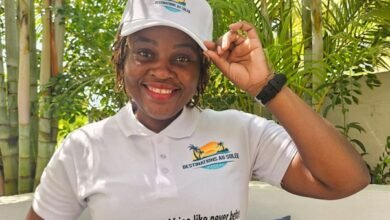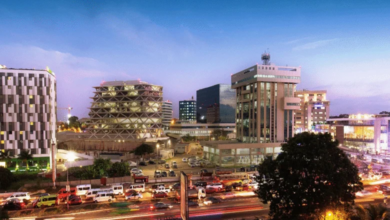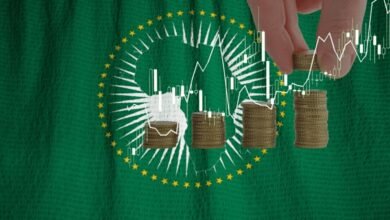South Africa is currently going through wave after wave of economic instability. While growth problems before the pandemic were structural and long-standing, the difficulties are growing. However, there are bright spots in this gloomy picture with a positive spurt of local investment in green energy. Meet two economists, Hugo Pienaar from BER and Gina Schoeman from Citi.
By Farai Diza, Johannesburg
Lire la suite : Forecast on South Africa’s economic growth very lowThe Phala Phala farm heist scandal as well as the ongoing power blackouts have compounded matters. One is political. The other concerns energy. The Phala Phala farm lies on the outskirts of a town called Bela-Bela in Limpopo, the northernmost province of South Africa. According to its website, it spans 4,500 hectares (11,120 acres). On June 1, 2022, Arthur Fraser, the former head of the South African State Security Agency, the country’s spy agency, walked into a police station in Johannesburg and filed a criminal complaint against President Cyril Ramaphosa. Fraser accused Ramaphosa of kidnapping, bribery, money laundering, and concealing a crime in relation to the alleged theft of $4m from his Phala Phala Farm, in a 12-page sworn statement, accompanied by photographs, documents and closed-circuit television (CCTV) footage of the alleged theft taking place, according to Al Jazeera. Seriously in debt, the state-owned company Eskom, which produces 90% of the country’s electricity, is struggling with ageing and poorly maintained power stations that regularly break down. To make up for the shortfall, the population of 60 million and businesses are subjected to scheduled load shedding. The duration of these blackouts has reached record highs since last year, up to more than 11 hours per day. The country is currently in stages 3 and 4 of load shedding on a scale of up to 8, with the latter stage providing for more than 13 hours of outages per day.
On the basis of this observation, Chief Economist at Bureau for Economic Research (BER) Hugo Pienaar says the country’s fortunes this year will be determined by a tug of war between persistent rolling blackouts and a notable slowdown in global growth on the one hand, and a positive spurt of local green energy investment on the other.
Healthy private sector fixed investment
The BER has penciled in healthy private sector fixed investment growth of 4.7% year on year, as some of the expected private sector renewable energy projects come on stream.
« If you want to carry on in South Africa, you have to become less reliant on Eskom. And, now that licensing requirements have become less onerous, we could start to see a boom in green energy investment », said Pienaar.
However, the BER expects the country’s real export growth to contract by 2% y/y, as a result of the expected global slowdown, load-shedding, which is likely to be at least as bad as last year, and lingering freight rail problems at Transnet.
The final outcome depends on whether the push from green energy investment is stronger than expected, and whether the drag from load-shedding and the global slowdown turns out to be weaker. If so, the economy could grow a bit stronger than expected. More likely, however, is that South Africa will need to get past a rather bleak 2023 before it sees a decisive pick-up in growth.
« Global conditions are having an impact, inflation hurts, and power outages are only souring things more »
« Global conditions are having an impact, inflation hurts, and power outages are only souring things more », says Citi Economist Gina Schoeman. She expects according to her researches economic activity to slow to 1.4% this year before rebounding to 1.9% in 2024.
She notes that, in addition to load-shedding and fixed investment, the key determinants of South Africa’s growth rate will be commodity price movements, especially of oil, as well as the extent of rand weakness, as this will influence how rapidly inflation comes off and how soon the Reserve Bank will be able to relax its hawkish stance.
But the pick-up in fixed investment will be the « golden key », she says. « If South Africa can get [the self-generation and renewable energy fixed investment] story right, we have a chance of moving growth back up to our historical average of about 2.5%. »






